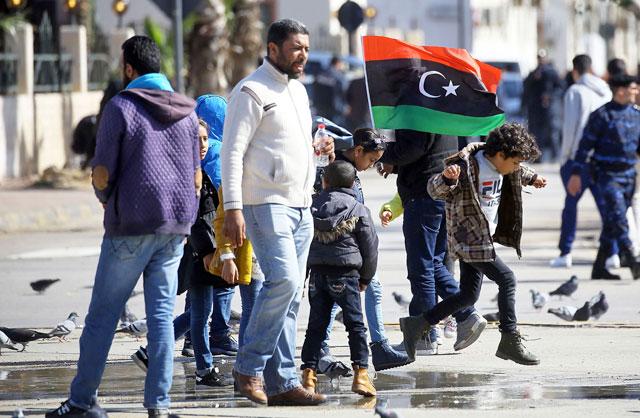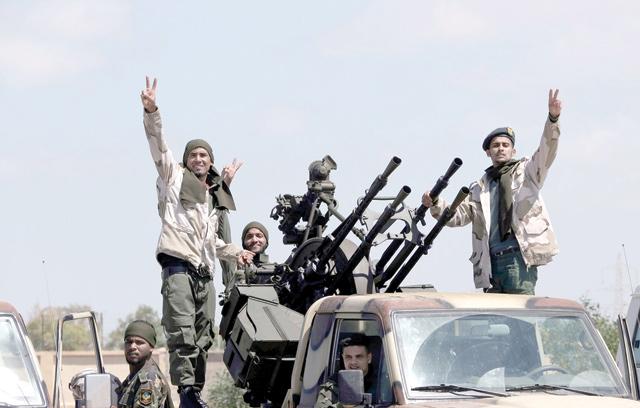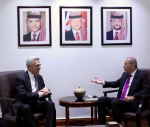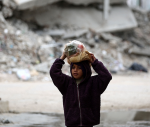You are here
Post-Qadhafi Libya slides from crisis to crisis eight years on
By AFP - Feb 19,2019 - Last updated at Feb 19,2019
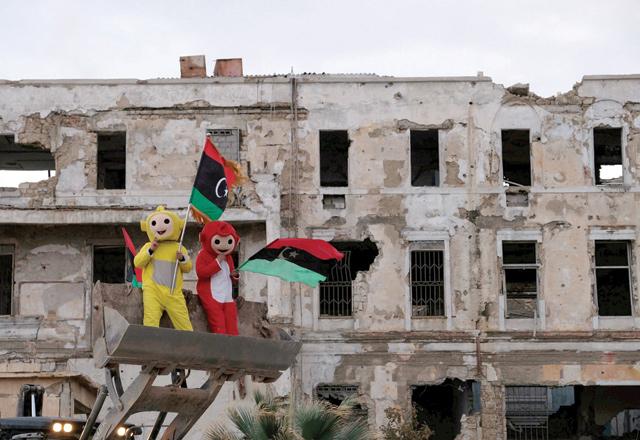
Boys wear costumes and carry Libyan flags during a celebration of the eighth anniversary of the revolution in Benghazi, Libya, on Sunday (Reuters photo)
TRIPOLI — Eight years after the revolt in Libya against Muammar Qadhafi's authoritarian regime, a modern and democratic state remains a distant dream in a country which has been sliding from crisis to crisis.
While no major celebrations are planned for the anniversary of the uprising which started February 17, 2011 in the thick of the Arab Spring, Libyans profess no great nostalgia for the Qadhafi days.
"I cannot regret Qadhafi's time because what Libya is today is the product of 42 years of systematic destruction," said Marwan Jalal, a 43-year-old oil industry engineer, referring to the autocrat's four decades in power.
"Sooner or later, Libyans will find peace but the journey seems long," he said.
Post-Qadhafi Libya has remained a battleground, both on the terrain and in politics, between a myriad of rival militias and political factions operating with impunity.
"The political and military divides... are deepening and efforts to bring rival constituencies to the table have thus far failed," said Claudia Gazzini, an analyst with the International Crisis Group.
"There is no quick recipe to solve Libya's multilayered crisis," Gazzini said.
"Any effort to unite Libya requires an integrated strategy with a political, a security and an economic component complementing each other and working together towards a common objective."
‘Purge’ of south
In the latest emergency, military strongman Gen. Khalifa Haftar has launched a military push in southern Libya which he says is aimed at rooting out "terrorists" and foreign fighters.
The offensive has fuelled new tensions in a country already wracked by violence and torn between rival administrations since the overthrow and killing of dictator Qadhafi.
The vacuum has been exploited by unscrupulous people traffickers taking full advantage of the migration crisis.
A power struggle between the UN-backed Government of National Accord (GNA) based in Tripoli and a parallel administration backed by Haftar's self-styled Libyan National Army (LNA) in the east has left the country's vast desert south a lawless no-man's land.
The rugged territory bordering Algeria, Niger, Chad and Sudan has become a haven for jihadists and armed groups, including Chadian rebels.
The LNA in mid-January announced the start of its offensive to "purge the south of terrorists and criminal groups".
The region also hosts a struggle between Libya's minority Tubu community and Arab tribes, particularly over control of lucrative cross-border smuggling routes.
"An escalation has thus far been averted, in part because anti-Haftar forces in the north have refrained from jumping into the fight, but the risk of retaliatory violence is still in the air and alliances with local tribe-based armed groups could prove fragile," according to Gazzini.
Tripoli militias have condemned Haftar's operation as a power grab, although the GNA itself has not been as explicit in its opposition.
‘Escalation’
Analysts warn that the LNA's assault could endanger UN-led efforts to convene a "national conference" aimed at organising already long-delayed elections this year as a way out of the political impasse in Libya.
But "the repeated delays and the vagueness surrounding the UN-backed event have alienated important constituencies who are now eyeing alternative strategies outside the UN framework in order to bolster their position," said Gazzini.
Emad Badi, a Libyan analyst, warned that "current developments are conducive to escalation and actors' military confrontation rather than dialogue".
Related Articles
Tripoli — Eight years after the revolt in Libya against Muammer Qadhafi's authoritarian regime, a modern and democratic state remains a dist
TRIPOLI — The conflict shaking Libya escalated Sunday as forces of strongman Khalifa Haftar launched an air strike on a suburb of Tripoli an
BENGHAZI, Libya/TUNIS — Residents of Derna in east Libya say they are facing critical shortages after Khalifa Haftar's Libyan National Army


